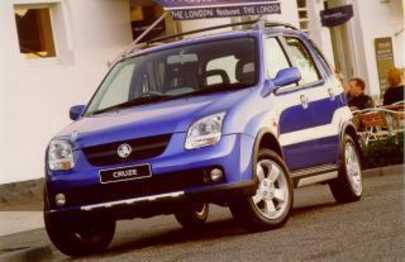
The Holden Cruze 2004 is priced from $3,999 for SUV Cruze (base).
The Holden Cruze 2004 is available in Regular Unleaded Petrol.
SUV
| Holden Cruze Models | SPECS | PRICE |
|---|---|---|
| (base) | 1.5LULPRegular Unleaded Petrol4 SP AUTO4 speed automatic | $3,410 – 5,280 |
| (base) | 1.5LULPRegular Unleaded Petrol5 SP MAN5 speed manual | $2,200 – 3,520 |
Holden Cruze 2004 FAQs
Check out real-world situations relating to the Holden Cruze 2004 here, particularly what our experts have to say about them.
-
My 2004 Holden Cruze manual is getting oil in the number two spark plug tube. Where could it be coming from?
Like a lot of relatively modern engine designs, the Cruze uses a spark plug centrally located in the cylinder head. That means that it’s between the two camshafts in the Holden’s case, and that means the spark plug lead needs to effectively pass through the rocker cover to attach to the spark plug. In turn, that means that the spark plug sits at the bottom of a tube that forms an oil-tight chamber between the inside of the tube (where the plug lives) and the inside of the rocker cover (which has oil flinging around inside of it when the engine is running).
The problems start when the seal at the bottom of that tube fails and allows oil to seep into the tube from the rocker cover. That’s when you’ll see the oil you described. The fix is to remove the rocker cover and replace either the whole gasket, or the O-ring seal (depending on the design). If it’s the latter, don’t just replace the one that’s leaking now, replace all of them as the rest won’t be far behind the one that’s already leaking. O-rings and gasket start to become hard and brittle as they age, and that’s when leaks will occur. This is not a huge job to fix, but left unchecked, it can allow the engine to begin to misfire.
Show more -
Braking issues with 2004 Holden Cruze
Any time you have a soft brake pedal, you also have the potential for sudden brake failure. On that basis, you really shouldn’t drive this car anywhere, just in case the entire system decides to fail at the worst possible moment.
Meantime, the noise you’re hearing could be the sound of a leaking brake booster which is losing vacuum and, therefore, braking pressure. But if that was the case, you’d expect the brake pedal to go hard and require more effort to push it, not the other way around.
In many cases, a soft brake pedal is an indication of air in the system. The system should be full of brake fluid, not a combination of fluid and air. That’s because brake fluid is incompressible and, therefore, transfers all the braking force to the brake pads and rotors, stopping the car effectively. Air, on the other hand, is very compressible, and its presence will take away the brakes’ efficiency leading to the soft pedal you’re feeling. But it’s not just a soft pedal; you’ll also experience longer stopping distances and less outright braking power when you need it in an emergency.
Your car may need a brake overhaul, new brake fluid or perhaps just a process called bleeding (where the air is removed from the system). Either way, don’t drive it any farther.
Show more

